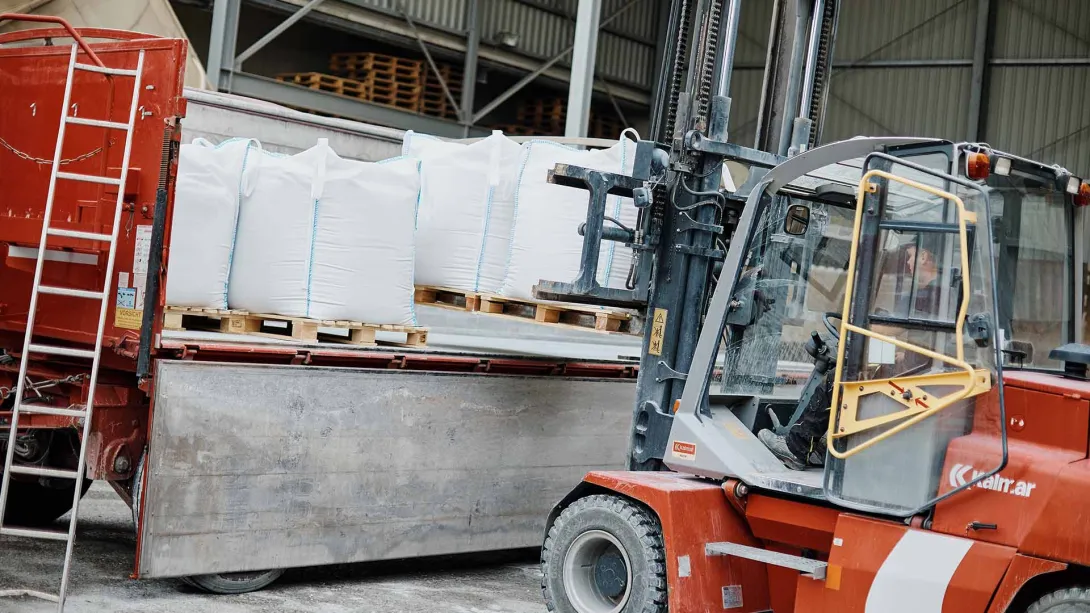How does Big Bag filling work at Karl Michels GmbH & Co. KG? An interview with our specialist, Andrei Nagy.
Summary
At Karl Michels GmbH & Co. KG, bulk materials from silos are filled into Big Bags precisely, cleanly, and with gram-level accuracy using a modern Big Bag filling station. The experienced team led by specialist Andrei Nagy ensures every filling job is contamination-free, transport-safe, on schedule, and tailored to each customer’s requirements.
Table of Contents
What exactly is your role at Michels?
Why are Big Bags so efficient in modern bulk logistics?
How does Big Bag filling at Michels work in practice?
What quantities and materials are typically processed?
What does a typical workday look like for you?
Where are the biggest challenges – and what does a successful day look like?
What do you particularly value about Michels?
What are the advantages of Big Bag filling with Karl Michels GmbH & Co. KG?
Conclusion: Precision and flexibility in Big Bag filling
FAQ – Frequently asked questions about Big Bag filling
Andrei, what exactly is your role at Michels?
I’m responsible for ensuring that bulk materials are filled into Big Bags cleanly, precisely, and on time – every day, across varying quantities and different materials. I oversee both Big Bag filling (loading bulk materials into Big Bags) and the reverse process, silo ensiling, where we load silo trucks with materials that have previously arrived in Big Bags or sacks. Together with my colleagues, I make sure all steps mesh seamlessly. No two days are the same – that’s exactly what makes my job so varied and engaging.
Why are Big Bags so efficient in modern bulk logistics?
Many of our customers work with Big Bags every day, but it’s still worth highlighting what makes them special. A Big Bag – also called a Bigbag or FIBC (Flexible Intermediate Bulk Container) – is a large, robust woven container. Today’s logistics demand flexible, clean, and safe transport. More and more companies use Big Bags because they are ideal for storing and transporting powdery, granular, or pelletized bulk materials.
Typical properties of a Big Bag include:
- Reusable and UV-resistant
- Available with or without inlet and discharge spouts
- Coated or uncoated
- Capacity typically between 500 and 1,500 kg
- Common sizes include 90×90×120 cm or 100×100×150 cm
Big Bags are extremely versatile and enable efficient, safe, and flexible logistics. However, it’s not only the Big Bag itself that matters – the professional filling is decisive. Only precise filling ensures material quality and dosing accuracy, and keeps the downstream logistics steps efficient.
How does Big Bag filling at Michels work in practice?
At Michels, bulk materials from silos are filled into Big Bags with gram-level accuracy using a modern Big Bag filling station operated by experienced specialists. Depending on the order, we place the bags on Euro pallets or single-use pallets, secure them for transport, and can also process customer-supplied Big Bags and pallets on request. To maximize usable volume and ensure stability in transit, we compact the product on a vibrating table. The vibration distributes the bulk material evenly so the Big Bag retains a compact, stable shape.
Step-by-step: the Big Bag filling process
- Inbound bulk material: Material arrives into storage silos or as bulk deliveries.
- Material check: Inspection for moisture, cleanliness, and material suitability.
- Fill Big Bag: Material is fed into the bag via the Big Bag filling station.
- Compaction: A vibrating table compacts the filled product for stability.
- Weight control: Integrated weighing systems ensure the exact target weight.
- Palletizing & securing: The Big Bag is placed on Euro or single-use pallets and wrapped for safe transport.
- Documentation & labeling: Each unit receives a label for full traceability.
- Loading & transport: Filled Big Bags are staged for dispatch or temporarily stored at our Meudt site.
Our Big Bag filling station runs precisely, cleanly, and efficiently. The result: contamination-free, transport-secure units tailored exactly to customer specifications. On request, we can store filled Big Bags on site, handle transshipment, and transport Big Bags on schedule – ensuring smooth hand-offs between warehousing, transport, and further processing.

What quantities and materials are typically processed at Michels?
Depending on the order situation, we fill between 25 and 75 tons per day – equivalent to multiple truckloads.
Typical materials include:
- Plastic granulates
- Lime, cement, sand
- Pigments, powders, additives
- Construction materials and non-hazardous chemicals
What does a typical workday look like for you?
I start the day by planning the filling processes with our scheduling team. We clarify which vehicles will be loaded at what times. Depending on demand, we ensile three to five silo trailers per day or fill 25 to 75 tons of material into Big Bags. Teamwork is crucial – everyone knows their role, and we support each other.
Where are the biggest challenges – and what does a successful day look like?
Coordination is the biggest challenge. The workload can change at short notice, yet everything still has to run punctually, cleanly, and safely. A successful day is when we get everything done despite time pressure – thanks to clear communication and real team spirit.
What do you particularly value about Michels?
I especially appreciate the strong team spirit. Everyone helps each other, and you can rely on your colleagues. The team is friendly and motivated; even on busy days the work is enjoyable. We communicate openly and support one another.
What are the advantages of Big Bag filling with Karl Michels GmbH & Co. KG?
One major advantage for Michels customers is flexibility. We also fill customer-supplied Big Bags and pallets, saving resources and supporting a circular approach. With efficient planning, we can handle short-notice orders, often the same day.
To ensure contamination-free Big Bag filling, our systems are cleaned after each job. This safeguards product purity, even with sensitive materials.
Michels also brings decades of experience in bulk logistics, silo transport, and warehousing. Transparent processes, documented quality, and proven safety build trust. With qualified staff, modern equipment, and a broad service portfolio, Michels is a reliable partner for logistics services. We offer all process steps from a single source: collection from a silo or with a tipper, filling into Big Bags, and onward transport – e.g., by walking-floor trailer or silo trailer. We can also collect palletized goods, ensile them, and then deliver as loose bulk. This integrated approach eliminates frictional losses and delivers maximum efficiency, product safety, and on-time performance.
Advantages of Michels Big Bag filling
- Gram-level accurate filling via modern weighing technology
- Contamination-free, clean processes
- Maximum flexibility – from single bags to full truckloads
- Transport-safe palletizing (Euro or single-use pallets)
- Processing of customer-supplied packaging
Want your Big Bags filled professionally?
Get in touch – our team will be happy to advise you on the optimal Big Bag filling setup.
Conclusion: Precision and flexibility in Big Bag filling
The work of Andrei Nagy and his team shows how much know-how, technology, and dedication go into Big Bag filling. At Michels, that means clean processes, on-time delivery, and tailor-made solutions. Whether silo ensiling, Big Bag filling, palletizing, or transporting Big Bags – Michels stands for reliability and precision down to the last detail.
FAQ – Frequently Asked Questions about Big Bag Filling
How many kilograms fit into a Big Bag?
Depending on the material, typically 500 to 1,500 kg.
What are standard Big Bag sizes?
Common sizes include 90×90×120 cm or 100×100×150 cm.
Are Big Bags standardized?
Yes – according to DIN EN ISO 21898. We can also fill custom sizes.
Can I supply my own Big Bags or pallets for filling?
Yes. We can process customer-supplied Big Bags and pallets, precisely to your specifications.
How fast can you complete a filling order?
Orders are typically completed the same or next business day.
Where do you offer Big Bag filling?
At our Meudt (Westerwald) site – ideally located between Cologne and Frankfurt, close to the A3 – with service available nationwide.
How precise is the target weight per Big Bag?
Our systems allow gram-level precision based on your target weight.
How do you ensure product purity during filling?
We maintain contamination-free filling processes, clean ensiling, and controlled workflows so the product remains clean and free from contamination.
What does Big Bag filling cost?
Pricing depends on quantity, packaging type, and specific requirements. We’re happy to provide a tailored quotation.
For all questions, the team of
Spedition Michels is at your disposal.

